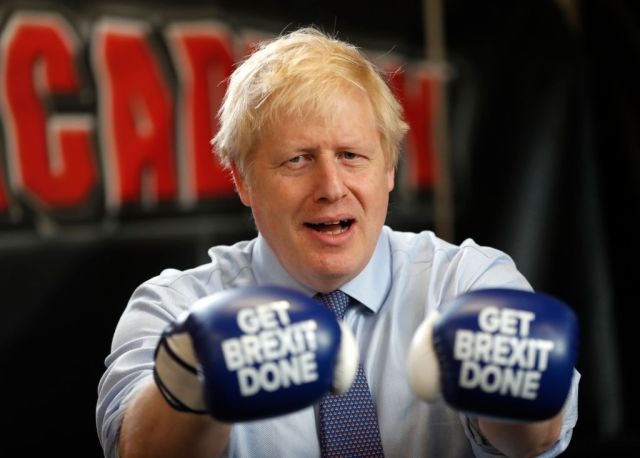Credit: Frank Augstein – WPA Pool/Getty Images

Three words won this election for the Conservatives. Get Brexit Done. That is the main finding from research by J.L. Partners and UnHerd on how and why people voted yesterday.
We asked a representative sample of 2,000 voters on the day of the election how they had voted and why. Of those who said they voted Conservative, 85% put ‘to get Brexit done’ in their top three reasons. That was also the choice of almost nine in 10 of the people who voted Conservative for the first time yesterday.
How was this message so successful, when only two years ago, another three-word slogan, “strong and stable”, helped deprive Theresa May of her majority? The differentiating factor is that it was not a phrase cooked up by some grand strategist — but one that came straight from the public themselves. It was not an enthusiastic call to arms for Brexit, but instead a tired longing for closure. It was the refrain of people up and down the country, desperate for the EU infighting to stop and for proper issues to be given attention once more.
I have heard the phrase repeatedly in focus groups from as far back as January, when I was in Downing Street. But the unfortunate truth was that when Theresa May said “get Brexit done”, MPs thought she was trying to brush the detail under the carpet. An apparently true believer such as Boris Johnson could embrace the phrase with no problem at all.
More than a saying, though, it was also a quiet thought in the back of voters’ minds. The power of this latent thought is what most probably explains why the narrowing we saw in the polls in the final week did not come to fruition. People may have been talking about public services and the NHS in the last few days, but when it came to putting the cross in the box, they were thinking about putting an end to the Brexit process. And if public services were on their mind, it was in the context of the Conservative Party’s message: they can only be improved if you get Brexit out of the way first.
Of course, the election was not all about leaving the European Union. Focus groups throughout the campaign consistently showed Jeremy Corbyn to be toxic for the working-class voters who abandoned Labour in droves. He may have won them over in 2017, but he went into this contest as a much better known quantity. Crucially, anti-Semitism cut through in a way it hasn’t before: of direct switchers from Labour to the Conservatives in our poll, almost one in five cited Labour’s anti-Semitism problem as an important factor in deciding their vote.
Other past episodes hurt Corbyn. His obfuscation on Brexit is an obvious one, but when I ran the polling at No 10, we found his fudged response to the Salisbury attack fatally undermined him. Although little reported, his reversal on his pledge to abolish student debt in the summer of 2017 eroded his reputation for authenticity with many of his more enthusiastic supporters.
This time round, the Conservative strategy fit the leader. In 2017, pollsters on that campaign (read: not me) saw that Theresa May was popular and accordingly recommended her name went on the side of a bus and she run a presidential style campaign. This was an approach which did not suit her. It does suit Boris, and he has clearly had quite a fun time over the last few weeks.
The role of the economy was also more relevant in this campaign than in 2017. It was the third-most cited reason by those new Conservative voters. This is doubtless linked to concerns about Labour’s economic record and spending plans. Labour’s individual policies might be popular, but voters had very little faith they could ever be delivered — or, if they could, voters feared the economy and their own livelihoods would suffer. Eleven years on from the financial crisis, it is striking how often the phrase “it could be just like last time” comes up in focus groups. This is borne out by the data: if you stuck with Labour from 2017, then the manifesto was a big issue, but none of the other key groups cite the manifesto as a reason for their vote.
Finally, the electoral dynamics favoured the Conservatives more this time round. The Brexit Party was more popular than UKIP was in 2017, and though there were some seats where they did seem to curtail the Conservatives, they also seemed to take a significant number of votes from Labour — making the Tories even more competitive.
The Liberal Democrats had a truly woeful evening, with the British public delivering the ultimate punishment for chutzpah by depriving Jo Swinson of her seat. But their vote share was up on 2017, and the effect was to erode Labour’s support, and provide room for the Conservatives to not only hold seats such as Cities of London and Westminster, but also gain seats such as Kensington.
It all combined to create a big win for Boris. Big enough that he can define the Conservative Party — and the country — in his own image. A lot got him to this point. But those three words, Get Brexit Done, did more than anything else.
For full results of the UnHerd/J L Partners survey see HERE and for full tables see HERE










Join the discussion
Join like minded readers that support our journalism by becoming a paid subscriber
To join the discussion in the comments, become a paid subscriber.
Join like minded readers that support our journalism, read unlimited articles and enjoy other subscriber-only benefits.
Subscribe